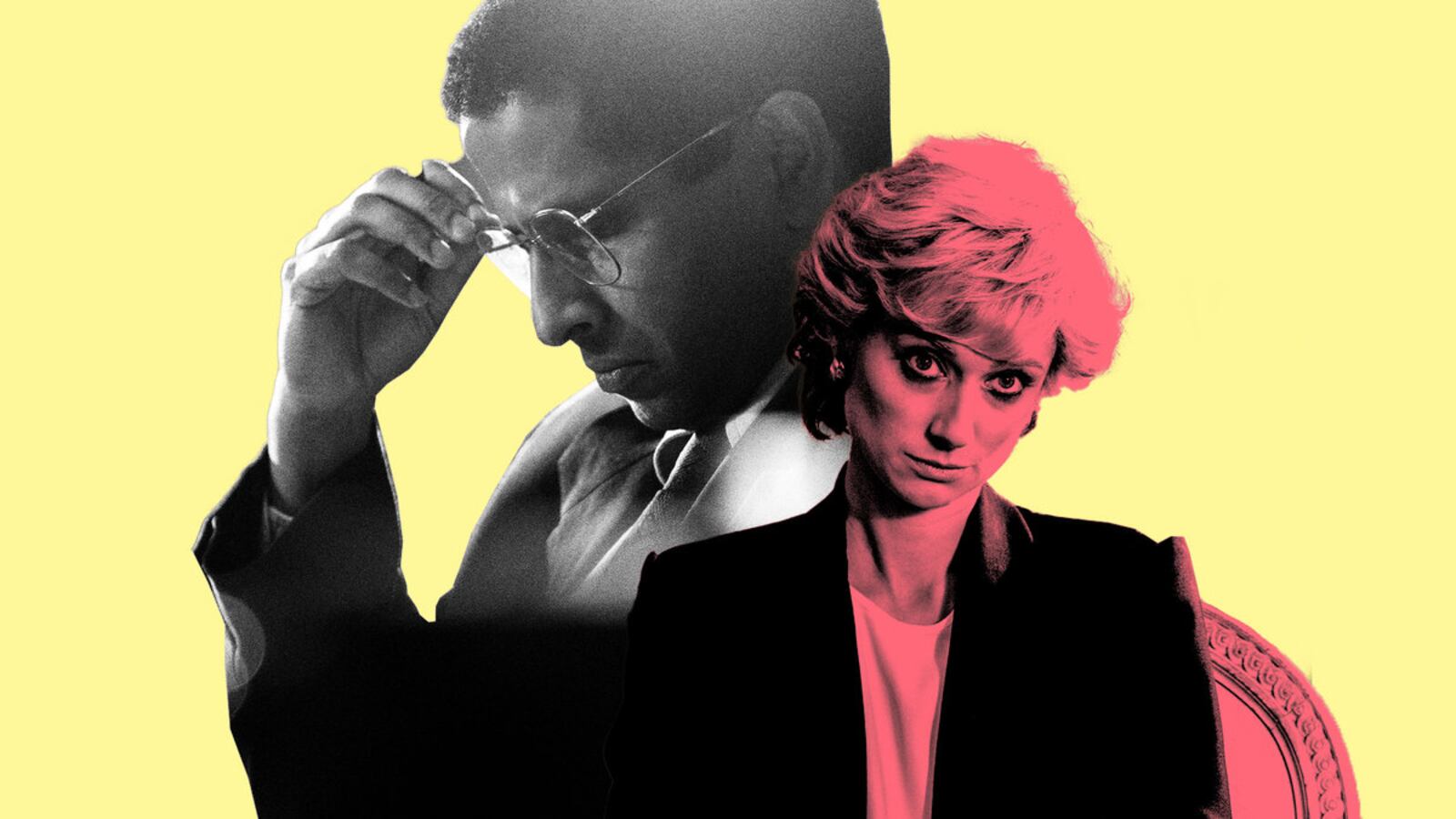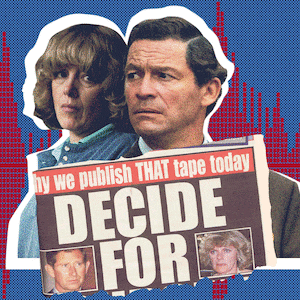Royalist is The Daily Beast’s newsletter for all things royal and Royal Family. Subscribe here to get it in your inbox every Sunday.
The depiction of Princess Diana’s famous interview with Martin Bashir, which was screened on the BBC weekly news show Panorama in 1995 and in which Diana revealed the misery of her royal life and exposed the sham of her failed marriage, is the beating heart of the fifth series of The Crown.
As it did in real life, everything else leads up to—and flows from—that extraordinary moment of television history.
In the key section of the interview, much of which is recreated, Diana spoke searingly about her husband’s relationship with Camilla Parker Bowles.
She was aware of their status as former lovers and the relationship restarting in 1986, she said, but added, “I wasn’t in a position to do anything about it.”
Bashir continued probing in a series of questions and when he asked Diana what “effect” her husband’s infidelity had on her, Diana replied: “Pretty devastating. Rampant bulimia, if you can have rampant bulimia, and just a feeling of being no good at anything and being useless and hopeless and failed in every direction...With a husband who loved someone else.”
The devastating takedown continued as Diana said that “Friends, on my husband’s side, were indicating that I was again unstable, sick, and should be put in a home of some sort in order to get better. I was almost an embarrassment... There’s no better way to dismantle a personality than to isolate it.”
However, it was when Bashir asked: “Do you think Mrs Parker Bowles was a factor in the breakdown of your marriage?” that Diana delivered the fateful line for which the interview would perhaps be best known: “Well, there were three of us in this marriage, so it was a bit crowded.”
The utterly faithful portrayal of sections of the interview itself is an act of public service by The Crown’s creator Peter Morgan, given that the royal family has succeeded in getting the interview pulled from the public record.
The BBC last year kowtowed to royal demands that the interview never be shown again, be pulled from online channels and not licensed for reuse by other broadcasters after an inquiry showed that interviewer Martin Bashir lied and showed Diana forged documents to secure the interview. (One can still access transcripts fairly easily.)
But Morgan’s careful restaging of Diana’s biggest moment, along with his unambiguous depiction of Bashir as a ruthless, cynical manipulator, cleverly and implicitly refutes the royal contention that Bashir’s deceptions render void everything Diana said in the interview.
The Crown, with admirable evenhandedness, shows what the royal family refuses to countenance: that two things can be correct at the same time—yes, Martin Bashir (played by Prasanna Puwanarajah) behaved abominably to secure the interview, but also that Princess Diana (Elizbeth Debicki) felt a number of things about her treatment by her then-husband and the royal family.

Martin Bashir interviews Princess Diana in Kensington Palace for the television program Panorama.
Pool Photograph/Corbis via GettyIt is interesting to speculate whether the character of Martin Bashir would have been drawn differently had the show been screened before the BBC published the results of an inquiry into the interview in 2021.
In that inquiry it was found that Bashir deceived Diana and her brother using forged documents, designed to feed off her fears that she was being followed, watched and otherwise spied on. While the establishment has long promulgated a line that Diana was deluded and paranoid, The Crown makes clear that she was justified in her fears (as many observers have since concluded).
However, from almost the first moment we meet Bashir, he is painted in an unflattering light.
Within minutes of having first been introduced to the rising star of the BBC, he is seen standing over the shoulder of a graphic designer, instructing the designer on what he would like to appear on a forged bank statement. We then see him presenting, quite shamelessly, the forged bank statements to Diana‘s brother, and then to Diana herself.
Bashir is the only character in The Crown who is drawn as a one-dimensional bad guy. The oleaginous slimeball’s only redeeming feature is that he is an effective reporter, “one of our best” as his editor describes him.

Prasanna Puwanarajah as Martin Bashir in The Crown.
Courtesy NetflixEven the character of Prince Charles has more going for him than this cynical manipulator, who in one scene emphasizes his Pakistani heritage, which he has previously dismissed, after Diana has decided it is an auspicious sign she should work with him because she has fallen in love with the Pakistani heart surgeon Hasnat Khan.
However it is in the staging, in Episode 8, of the interview itself, interspersed with cutaways of the rest of the family watching it, that The Crown really excels.
The royal family has argued, an argument apparently accepted by the BBC, that the duplicitous way in which Bashir obtained the interview has invalidated it and rendered it non-existent. The suppression has been so successful that the interview can no longer be licensed for reproduction, and has disappeared from platforms such as YouTube. The BBC has vowed it will never be shown on the BBC again.
There is no doubt that Bashir used underhand methods to secure the interview with Diana. There is equally no doubt that Diana meant every word of what she said. Especially, one imagines, the stuff about, you know, her husband being an asshole who cheated on her throughout their marriage.
Indeed, much of what she said in the interview were points she had previously made on the tape recordings that she smuggled out to Andrew Morton for his book, Diana Her True Story, as Morton himself pointed out in an interview with The Daily Beast.
In light of how excellent this episode is, if the BBC and the royals are going to seek to eradicate the original broadcast—without reference to which it is actually impossible to accurately tell Diana’s story—can we not have the whole thing done by Peter Morgan please? Something along the lines of Morgan’s terrific verbatim stage play, Frost/Nixon, perhaps?
The BBC’s craven, lickspittle act at the feet of the royals means that for millions of viewers, The Crown’s version of this interview will be the only one they will ever know.
It’s a good job, then, that they absolutely nailed it.







